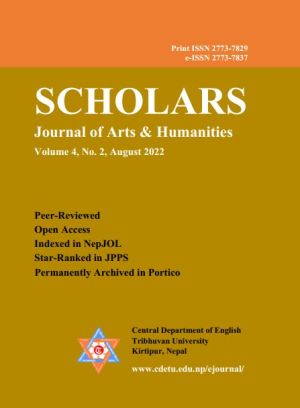Indigenous Characters and Their Nation: A Socio-Political Analysis of Selected Nepali Plays
DOI:
https://doi.org/10.3126/sjah.v4i2.47421Keywords:
Alienated, indigenous, elite, modern nation-stateAbstract
The rise of modern Nepali intellectuals especially in Kathmandu during the 1930s inspired many writers and political leaders to articulate new narratives of the nation. For instance, Balkrishna Sama’s Mukunda Indira, Bhimnidhi Tiwari’s Sahanshila Sushila (Permissive Sushila) present characters from various strata of Nepali society. In the plays, indigenous communities speak about the psycho-social realities of the time. The indigenous characters of the plays are humble and hardworking. But in the play Simma written by Rayan right before the 1980 referendum, the time the Panchayat regime became stronger and kept denying the people’s democratic rights the indigenous characters in plays become politically vocal. They question the polity based on modern social and political theories. However, the indigenous characters of Mayadevika Sapana (Dreams of Mayadevi) written by Abhi Subedi and staged in 2004 and later years speak for the universal peace and brotherhood. By drawing upon Ludwig Stiller and Mahesh Chandra Regmi’s social, economic and political interpretation of Nepal’s history, particularly of the nineteenth century, the article concludes that while presenting the indigenous characters, the playwrights directly and indirectly address the social and political ills of the Nepal society. These indigenous characters' attitude towards their masters and the representatives of the state around reflects the political and historical courses that Nepal has gone through over the centuries and the rise of a force that might free them from such lines of control.
Downloads
Downloads
Published
How to Cite
Issue
Section
License
Copyright (c) 2022 Central Department of English, Tribhuvan University and Authors

This work is licensed under a Creative Commons Attribution 4.0 International License.
© Central Department of English, Tribhuvan University and Authors




